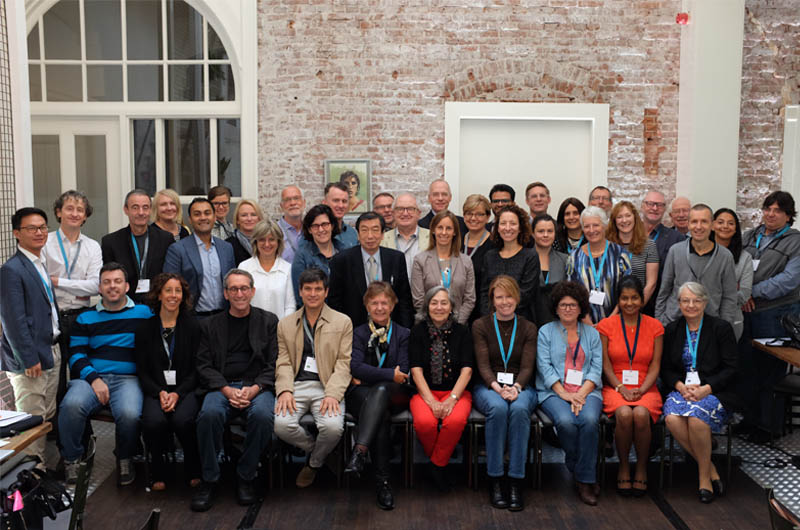The Fourth Choosing Wisely International Roundtable
Sep 21, 2017 - News
by Karen Born
On September 11 and 12, delegates from 21 countries assembled in Amsterdam to exchange ideas and plot the future directions for the movement.
The Fourth Choosing Wisely International Roundtable
Sep 21, 2017 - News
by Karen Born
On September 11 and 12, delegates from 21 countries assembled in Amsterdam to exchange ideas and plot the future directions for the movement.

Choosing Wisely is not just a national campaign, but an international movement. On September 11 and 12, delegates from 21 countries assembled in Amsterdam to exchange ideas and plot the future directions for the movement.
Choosing Wisely Canada has played a vital role in fostering the international collaboration by planning and organizing an annual meeting of leaders of campaigns from around the world. On September 12 and 13, 50 individuals who are involved in over 20 different national Choosing Wisely campaigns came together in Amsterdam.
This is the fourth annual meeting of the Choosing Wisely International Roundtable. The roundtable is organized by Choosing Wisely Canada, with support from The Commonwealth Fund in the United States, as well as the Bertelsmann Stiftung in Germany. This year’s meeting was hosted by the Dutch Federation of Medical Specialists and Stichting Kwaliteitsgelden Medisch Specialisten (SKMS).
The roundtable was an opportunity to learn about campaign innovations and translate local campaign work across borders and country contexts. It was also a chance for campaign leaders to develop collaborations on projects of shared interest, and to advance shared goals.
Among the new countries at the meeting this year were Saudi Arabia, Norway, Portugal, Spain, Poland and Denmark. The Choosing Wisely international community offers a number of resources and supports for new countries launching national Choosing Wisely campaigns. A Choosing Wisely ‘Starter Kit’, which has been translated into five languages, was shared with all participating countries.
Although there was substantial diversity among the countries represented at the meeting, it was clear that the issue of overuse is a shared challenge that health systems and providers worldwide are grappling with. To underscore the commonalities across campaigns, recommendations from campaigns across different countries were previously collated to develop a ‘Top 10’ list of Choosing Wisely recommendations worldwide. The criteria for the Top 10 were common recommendations that recurred across multiple lists and countries. This list includes recommendations related to unnecessary imaging and diagnostic tests and medications.
Research
Out of the international collaboration have emerged a series of research articles that have been written in collaboration with leaders of Choosing Wisely from nearly a dozen countries. The first article, published in 2014, is a framework for Choosing Wisely campaigns and sets forth principles which all campaigns must abide by. These principles ensure that campaigns are focused on quality and avoiding harm and not used as a cost cutting measure.
The second article is a measurement framework of Choosing Wisely campaigns and provides an overview of potential indicators by which to measure changes associated with campaigns.
The third article is a framework for patient and public involvement in Choosing Wisely campaigns. It offers a spectrum of potential patient and public engagement strategies, examples and associated measures.
Measurement & Evaluation
Campaigns are compelled to demonstrate value and that recommendations have an impact on practice and outcomes. There are collaborations underway related to shared approaches to measuring the fidelity of Choosing Wisely campaigns. These include efforts by the OECD to develop common indicators of overuse. In a 2017 Report ‘Tackling Wasteful Spending on Health’ and the OECD 2015 publication ‘Health at a Glance’ includes three measures aligned with Choosing Wisely recommendations. These measures for antibiotic overuse, unnecessary low-back imaging and unnecessary benzodiazepine use in the elderly were developed and reported upon across OECD member countries.
Medical education
Changing the culture of medicine to reduce unnecessary care is a central goal of campaigns, and efforts to reach the next generation of clinicians are vital to achieving this objective. The international collaboration includes educators who are working on efforts to engage medical students and trainees. Choosing Wisely Canada STARS, first started in Canada in 2015 is being adapted to both the Netherlands and the United States in 2017, with Japan and New Zealand also have grassroots, student leadership related to national campaigns.
Looking to the future
An important component of the meeting was planning for the future, and strengthening the international collaboration. The group did feel strongly that the opportunity to learn and collaborate across campaigns was very informative and useful. The group also felt that the global movement was gaining momentum and needed to be formalized with the development of an international steering committee to oversee the many collaborations underway. This ongoing strengthening of collaborative structures can ensure communication, learning and cooperation on the shared global challenge of reducing harm associated with unnecessary care.
